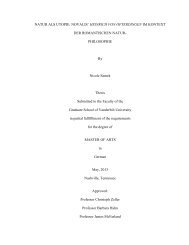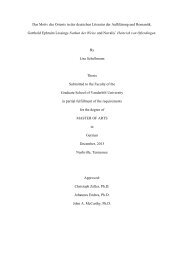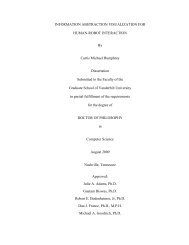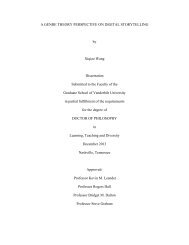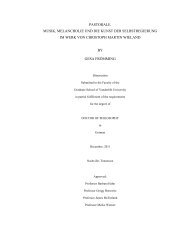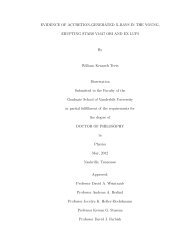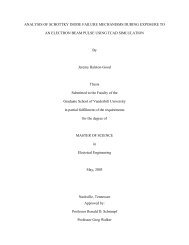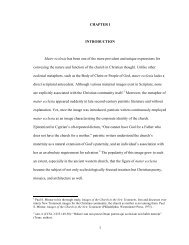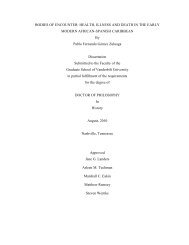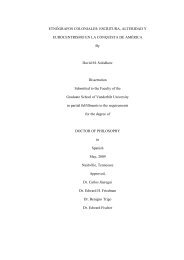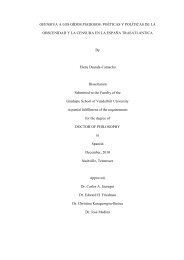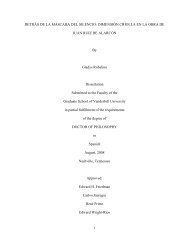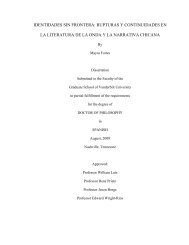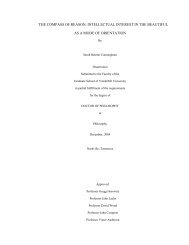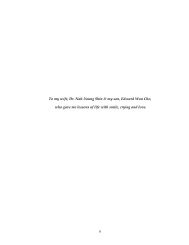THE DEATH OF DIONYSOS - ETD - Vanderbilt University
THE DEATH OF DIONYSOS - ETD - Vanderbilt University
THE DEATH OF DIONYSOS - ETD - Vanderbilt University
Create successful ePaper yourself
Turn your PDF publications into a flip-book with our unique Google optimized e-Paper software.
concludes that he has just begun to learn. As for the Abbé’s solemn declaration, it seems<br />
to imply nothing more than that fathering a child means school is over. But what school?<br />
What has been the substance of Wilhelm Meister’s Lehrjahre? Our analysis would appear<br />
to have led us right into one of the thorniest problems that has occupied scholarship of the<br />
Lehrjahre. If nineteenth-century readers simply assumed that Wilhelm’s adventures result<br />
in the harmonious development of his personality, scholarship of the novel in the<br />
twentieth century proved more skeptical–or, in the case of the faithful, more frustrated–<br />
about the status of the novel as a Bildungsroman. A few scholars, notably Karl Schlechta<br />
and Stefan Blessin, have finally broken down Wilhelm’s story into separate spheres or<br />
worlds, connected to one another by little more than chronology or concept, while sharing<br />
no mythos that would be centered in the experience of the hero. 22 Be that as it may, our<br />
interest in the meaning of Erfahrung in the novel provides another thread of continuity<br />
between the spheres. We recall that Wilhelm, while lacking experience of Gegenstände<br />
(objects) in the world, could at least lay claim to experiences of the heart and mind. These<br />
may seem of little importance in the eyes of Jarno or Lothario: paragons of restless, manly<br />
activity; but they are not without consequence in the course of Wilhelm’s own<br />
development. The Abbé had, after all, assured him that all episodes of one’s life<br />
contribute imperceptibly to one’s Bildung (422). The pedagogue would even declare the<br />
advantage of Wilhelm’s erring education: “‘Kein glücklicheres Schicksal kann einem<br />
Menschen werden’” (495). [“‘No man could have a happier fate’” (EAB 303).] Did he<br />
say Schicksal?! The same fate that he earlier had dismissed?<br />
22 Blessin describes the structure of the Wilhelm Meisters Lehrjahre thus: “Der erste Meisterroman<br />
ist seiner Entstehung und inneren Logik nach aus drei Romanen gebildet: der Mariane-Handlung,<br />
der Theatralischen Sendung und den Lehrjahren”(89). [“In terms of the production and inner logic<br />
of the first Meister novel, it is comprised of three novels: the Mariane-story, the Theatric Mission<br />
and the Apprentice Years.] Regarding the content of Book One, the Mariane-romance, he<br />
concludes, “[Es] ist ein selbständiges Buch und aus mehreren Gründen nicht völlig in den Roman<br />
integriert” [“(It) is a separate book and for several reasons not fully integrated into the novel”]<br />
(Ibid.). Blessin finally traces the unity of the novel to the world it presents–rather more like a<br />
universe, really, that encompasses the particular worlds of the characters: “Wir sehen darin die<br />
eigentliche Leistung der Lehrjahre, die eine Welt aus lauter Welten sind” (207). [“We recognize<br />
the actual achievement of the Lehrjahre, that is a world made up of separate worlds.”] Compare<br />
also the first and lengthiest part of Schlechta’s study, GoethesWilhelm Meister (Frankfurt a/M:<br />
Klostermann, 1953), titled “Die Sphären”, which dissects the two Wilhelm Meister novels into<br />
spheres, or loosely related clusters of plot and meaning. We will see, however, that the separate<br />
story of Mariane is indeed woven carefully into the thematic matrix of Goethe’s novel.<br />
17



